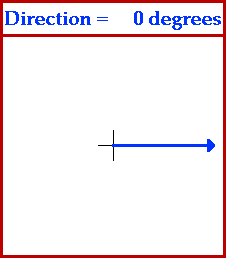
Vector
Direction
A GIF Animation
A vector is a quantity which has both magnitude and direction.
Examplesof vectors include displacement, velocity, acceleration, and
force. To fully describe one of these vector quantities, it is
necessary to tell both the magnitude and the direction. For
instance, if the velocity of an object were said to be 25 m/s, then
the description of the object's velocity is incomplete; the object
could be moving 25 m/s south, or 25 m/s north, or 25 m/s southeast.
To fully describe the object's velocity, both magnitude (25 m/s) and
direction (e.g., south) must be stated.
In order for such descriptions of vector quantities to be
useful, it is important that everyone agree upon how the direction of
an object is described. Most of us are accustomed to the idea that
"up" on a map refers to the "northward" direction and "right" on a
map refers to the "eastward" direction. This is a mere
convention which map-makers have used for years and upon which
we all can agree. But what is the direction of a vector quantity is
not due north or due east but somewhere in between north and east?
For such cases as this, it is important that there be some convention
for describing the direction of such a vector. The convention upon
which we can all agree is sometimes refered to as the CCW convention
- "counter-clockwise" convention. Using this convention, we can
describe the direction of any vector in terms of its
counter-clockwise angle of rotation from due east. The direction
north would be at 90 degrees since a vector pointing east would have
to be rotated 90 degrees in the counter-clockwise direction in order
to point north. The direction of west would be at 180 degrees since
a vector pointing west would have to be rotated 180 degrees in the
counter-clockwise direction in order to point west. Further
illustrations of the use of this convention are depicted by the
animation below.

For more information on physical descriptions of motion,
visit
The
Physics Classroom. Specific information is available there on the
following topics:
This page was created by
Tom
Henderson of
Glenbrook South
High School.
Comments and suggestions can be sent by e-mail to
Tom
Henderson.
This page last updated on 10/16/97.
